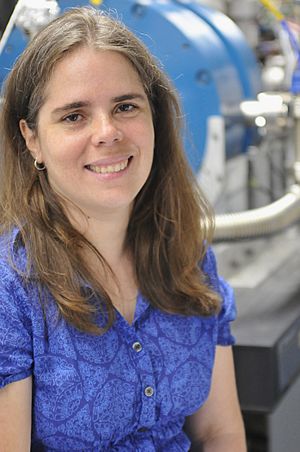Mayly Sánchez facts for kids
Quick facts for kids
Mayly Sánchez
|
|
|---|---|
 |
|
| Born |
Mayly Carolina Sánchez
June 26, 1972 |
| Nationality | Venezuela, United States |
| Alma mater | Universidad de Los Andes, ULA International Centre for Theoretical Physics Tufts University |
| Occupation | Researcher, academic |
| Years active | 2003- |
| Employer | Florida State University |
| Known for | Experimental work with neutrinos |
Mayly Sánchez is a brilliant scientist who studies tiny particles called neutrinos. She was born in Venezuela and now works as a particle physicist at Iowa State University in the United States.
In 2011, she received a very special award called the Presidential Early Career Award for Scientists and Engineers (PECASE). This is the highest honor the U.S. gives to young scientists. She earned it for her amazing work with neutrinos and for encouraging more girls to study science and math. In 2013, the BBC recognized her as one of the top ten women scientists in Latin America.
Contents
Early Life and Discovering Science
Mayly Sánchez was born in Caracas, Venezuela, on June 26, 1972. Her love for science started when she was young. She watched a TV show called "Cosmos" in the 1980s, which made her very interested in astronomy.
For her 12th birthday, she even asked for books about stars and planets! Her uncle told her that if she wanted to learn more about astronomy, she would also need to study physics.
When she was 13, Mayly and her family moved to Mérida, Venezuela. She went to an all-girls Catholic high school there. With help from her math and physics teachers, her focus slowly shifted from astronomy to physics.
Education Journey
After high school, Mayly went to the Universidad de Los Andes, ULA in Mérida. She earned her bachelor's degree in physics in 1995. Here, her interest became even more specific, focusing on fundamental physics, which is about the basic building blocks of the universe.
Next, she won a scholarship to study at the International Centre for Theoretical Physics in Trieste, Italy. In 1996, she earned a special diploma in high energy physics.
After her year in Italy, she moved to Boston, Massachusetts, in the U.S. She studied at Tufts University, where she earned her Master of Science degree in physics in 1998. Then, in 2003, she completed her PhD in physics. During this time, her passion became even clearer: she wanted to study neutrinos. Her PhD project was about how atmospheric neutrinos change.
A Career in Particle Physics
After finishing her PhD, Mayly Sánchez became a researcher at Harvard University. She continued her exciting work in experimental physics, especially with neutrinos. She also joined a team called MINOS (Main Injector Neutrino Oscillation Search) at a famous science lab called Fermilab.
In 2007, she became an assistant physicist at the U.S. Energy Department's Argonne National Laboratory. She still works there today. In 2009, she also joined the faculty at Iowa State University. She is now a Professor of Physics and Astronomy there. She also helps and guides many female students, leading groups like the Iowa State University Undergraduate Women in Physics.
Exploring Neutrinos with Big Experiments
Mayly's research is part of huge projects like the Long Baseline Neutrino Experiment (DUNE). This experiment plans to send a powerful beam of neutrinos from Fermi National Accelerator Laboratory in Illinois to a detector deep underground in South Dakota. Scientists hope this will help them understand how the universe began and why neutrinos change their "flavor" as they travel, especially through rock.
She also works on the Main Injector Neutrino Oscillation Search and NOνA experiments. These projects study how neutrinos change as they travel from Fermilab to detectors in Minnesota. Mayly is also a leader for another experiment called ANNIE (Accelerator Neutrino Neutron Interaction Experiment) at Fermilab.
In 2012, the White House announced that Mayly Sánchez was one of the winners of the 2011 PECASE Award. This is a very high honor for young scientists in the U.S. In 2013, the BBC recognized her as one of the top ten women scientists in Latin America.
Developing New Technology
Mayly's current work also involves creating better ways to detect neutrinos. She is helping to develop the next generation of "photodetectors." These devices are used to spot neutrinos, but they can also be used in medical imaging and other areas. Her goal is to make these detectors cheaper and more effective.
Awards and Recognition
- 2020 Fellow of the American Physical Society
- 2016 Fermi National Laboratory Intensity Frontier Fellowship
- 2013 BBC's Top 10 Latina Scientists
- 2012 Presidential Early Career Award for Scientists and Engineers (PECASE)
- 2012 Official Recognition from the Office of the Governor of the State of Iowa.
- 2012 Iowa State University Award for Early Achievement in Research.
- 2011 National Science Foundation CAREER Award.
- 2009 Hispanic Engineer National Achievement Award Corporation (HENAAC) Outstanding Technical Achievement Award.
See also
 In Spanish: Mayly Sánchez para niños
In Spanish: Mayly Sánchez para niños
 | Roy Wilkins |
 | John Lewis |
 | Linda Carol Brown |

